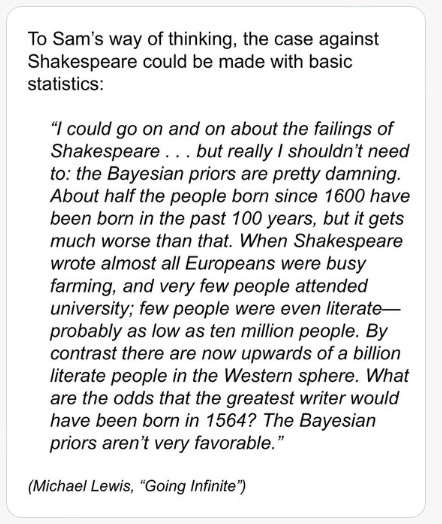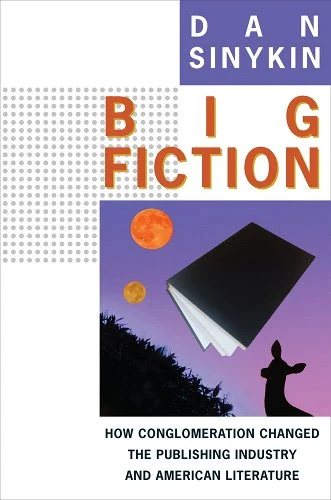Could We Have a Middle Class for Writers?
Patrons, subscribers, platforms, publishers, and as always, lots of books inside.
It’s been a tough week for old Bill Shakespeare.
First, Sam Bankman-Fried, on trial for one of the largest alleged financial fraud’s in U.S. history was discovered running down the odds that the Bard is really all he’s cracked up to be from inside of Michael Lewis’s book on SBF, Going Infinite: The Rise and Fall of a New Tycoon.
If that nonsensical babel doesn’t make your head spin, I bring you the claims of an unfortunately prominent racist white supremacist with a popular Substack newsletter (eagerly promoted by the Substack founders) who declared on Twitter that, “Pretty sure if you gave me a year I could write Shakespeare quality work. Like if someone hadn’t read all of Shakespeare and you randomly gave them me or him, on average they couldn’t tell the difference.”
I’m not going to link to the Twitter or Substack of the racist white supremacist because in addition to his racism, he is a troll who seeks attention by offering this nonsense bait to the world, waiting for people (like me, apparently) who take it up and amplify it even as we mock it.
What struck me by this incident, though, is that in today’s world of attempting to make one’s living by writing for the public, it is much more profitable to be a racist white supremacist troll than the next Shakespeare.
In fact, Shakespeare and the racist white supremacist have something in common in that they have been funded by wealthy benefactors, In the case of Shakespeare his Lord Chamberlains Men - the troupe which produced his early work - was funded by a guy named Lord Chamberlain who has some extra bucks given that he was, you know, a Lord. Producing theater for the masses was what he decided to put his fortune into.
Things have changed. There is now money to be made in the conservative and self-declared “enlightened centrist” (anti-woke) game.
The racist white supremacist has seen over a million dollars in dark money funneled his way through a “think tank” of which he is president, and one of only three named members. The racist white supremacist has also been provided opportunities for fellowships and speaking through the largess of Harlan Crow, a name you might recognize as Supreme Court justice Clarence Thomas’s good buddy who squired the justice around on a number of luxury trips just because they’re friends, and not at all because Crow is involved in a number of important cases before the Court. Crow is also a prominent funder of Bari Weiss, founder of her own Substack newsletter which pretends to be a source of news, kind of like her University of Austin pretends to be a university.
I was ruminating on these issues at the same time I was mulling over a couple of thought-provoking comments on last week’s installment on the closing of The Gettysburg Review and broader threats to the “national literature.” The Gettysburg Review has been running on a patronage model under the umbrella of Gettysburg College, reportedly costing the school around $200,000 per year. One of the comments that got me thinking argued that while the loss of a journal is sad, the fact is that people really don’t read it, that it can’t survive in a market outside of receiving patronage from the college, then maybe this is just part of an inevitable shift to a digital culture where we read things on our phones or publish in spaces like this one, without publication imprimaturs or gatekeepers.
Another comment asked me if I thought that Substack could serve as a route to a writing “middle class” that as I illustrated last week, doesn’t really exist.
Together, the comments got me thinking more deeply about what’s going on with this stuff today, and what these shifts might mean for writers and readers.
One thing I have to guard against is the danger of nostalgic thinking about the past, because often that past is not what we think it was. This was reinforced for me this past week by an article in the Nation, “What Was Literary Fiction” by Dan Sinykin, drawn from his book, Big Fiction: How Conglomeration Changed the Publishing Industry and American Literature.
The article tells the story of the birth of the marketing category of “literary fiction” in the 1980s, significantly driven by the editor Gary Fisketjon, the driving force behind the creation of the Vintage Contemporaries series, published as paperback originals and featuring distinctive cover designs (echoed by Sinykin’s cover).
(Dan Kois wrote an interesting piece about the origin and design of those covers for the New Yorker earlier this year.)
Vintage Contemporaries were developed by Gary Fisketjon not to fulfill an existing demand for “literary fiction” but because literary fiction could not be published profitably in original hardcover releases. He was attempting to create a market though marketing.
And it worked! Some of the books, like the first title released, Jay McInerney’s Bright Lights Big City became best sellers. Others like Joy Williams’ Breaking and Entering, and Nicholson Baker’s The Mezzanine helped establish more experimental writers with broader audiences.
Richard Ford’s The Sportswriter was published as a Vintage Contemporary in 1986, turning him from a respected, but lightly selling short story and novelist into a literary fiction writer who could publish his books in handsome hardcover editions, including 1995’s Independence Day, which won the Pulitzer Prize. Writers like Ann Beattie, Raymond Carver, Thomas McGuane, Toni Cade Bambara saw their work republished as Vintage Contemporaries and gain new and larger audiences.
I won’t repeat all of Sinykin’s piece, which is well worth your time, other than to remind myself and everyone else that markets are not purely organic that it can take some work to create them, and once created, they are not necessarily eternal. When I get busy lamenting the times gone past, it behooves me to recognize that you can’t stop evolution. Sinykin lays out why that moment was destined to run its course.
In a way Vintage Contemporaries, and other similar imprints that popped up acted as quasi patrons inside the broader publishing marketplace.
The more direct patronage model is awesome, provided you can get yourself a patron and you don’t have to do too much compromising in order to stay in their good graces. Some of Clarence Thomas’s defenders say Thomas’s failure to report the lavish gifts from conservative activists is not a big deal because he was going to vote the same way on cases anyway. It’s more of a tip for services previously contracted than a bribe.
But if your patron sours on you, you’re in trouble. Conservative blogger Rod Dreher managed to alienate the patron who had been funding his blog at The American Conservative to the tune of six figures a year when Dreher got “too weird,” including musing on his young fascination with the “primitive root wiener” of an uncircumcised classmate.
If anyone would like to splash six figures on me to do this newsletter, feel free to reach me through my email, but given that I’m doing okay as is, I’d rather not bend my editorial sensibilities to those of another. Aggregating small amounts from lots of individuals is good protection against running afoul of a single wealthy benefactor, but it still leaves the writer directly beholden to the whims of the crowd in ways that aren’t true when the are working under the umbrella of a publication.
By belief and disposition I tend to think we do better when we are bundled together under a broad common cause, rather than unbundled and left to our individual fortunes, but it is undeniable that a decent number of individual writers are doing much better for themselves on a platform like this than they would as part of a publication.
I think it’s a mistake, however to believe that a Substack newsletter author necessarily experiences more freedom than someone who writes for a publication. It’s really strikes me as a matter of what kind of freedom one prefers.
A solo operator on a platform has total control over their time, subject matter, attention, etc… If their work generates attention and revenue they get to benefit from all of that attention and reap that revenue.
But, writing for a publication can provide a form of security that is itself a form of freedom. Knowing that even if you don’t produce for a week or two, but can still receive an income is a great comfort. Having someone else worry about the business parts of receiving money for the selling of words is a great relief. One of the reasons Substack has become so popular is that they manage to split the difference of these freedoms, providing the platform and backend that allows writers to (mostly) write. In turn they (and other third parties) get around 20 cents out of every dollar in subscriptions.
When I was a kid growing up in the Chicago area, famed columnist Mike Royko jumped from the Chicago Sun-Times to the Chicago Tribune after the Sun-Times was purchased by Rupert Murdoch. For some, Royko was the reason why they subscribed to a the paper, so his switch was a big deal, particularly considering that Royko has previous declared that he’d never work for that Republican rag. I’m certain Royko commanded a handsome salary for the time, but it was much less than what he was probably worth in an unbundled world. Royko’s popularity and ability to draw subscribers allowed the publication to do things not Royko related as part of the broader mission of the publication.
Personally, provided I had the freedom to continue to write to my own interests and conscience (as I do even under the publication umbrellas of Inside Higher Ed and the Chicago Tribune) I would prefer a salary of $100,000 a year to write a couple of times a week versus say, $400,000 I could earn being a successful hustling Substacker like the most popular newsletters here. I want to write, not be an entrepreneur or manage a publishing business.
But that model is rare these days as newspapers and other media have declined and platforms like this one have risen up to take their place.
One exception is the Defector website born out of the old Deadspin website, which had been running as a sustainable concern until they were purchased by a media conglomerate that wanted to make more money and in doing so, ruined all that was good and interesting about the writing in the pursuit of “traffic.” A group of 19 writers decided to break off and do their own thing, establishing an employee-owned new publication named Defector. At the time, there were a number of Deadspin writers who absolutely could have broken off as solo artists, decamped to a place like this one and made much more money than they would have starting a new publication and pooling collective fortunes.
But these writers recognized the benefits of being bundled together and low and behold, over three years on, it’s working. There are no 25 full-time employers, a robust budget to pay freelancers and over 40,000 paying subscribers. All revenue goes back to paying the people who contribute to putting words on the page. Yes, it’s a business where having more revenue than expenses is a necessity, but it’s run according to the core purpose of not to make money, but to produce interesting writing. This is what the people who have banded together want to do, so they’re doing it.
To the question from last week about how to create a middle-class for writers, I think the Defector model is about as promising as it gets. It requires some folks to earn less than they might in an unbundled situation, and a commitment of all to a shared mission, but reading and observing the writers at Defector they seem about as free as I could imagine or ever hope to be.
In the end, whatever choices one makes are going to involve tradeoffs. It’s a matter of what constraints you want to accept. Big money patronage from an ideological ally requires you to maintain that allyship. I’m envious of the monetary support Bari Weiss seems to be able to draw upon for her various projects, but the thought of cozying up to Harlan Crow to fund my dreams makes me want to barf.
Small donor bundling for patronage requires an endless hustle. Duking it out in the profitable parts of the marketplace means being willing and capable of producing something the market finds favorable.
I say this as a writer who probably fits that middle class definition, making a reasonable annual income on my writing that’s then supplemented by writing-related work, but who is well below that top 10%. But the sheer luck and oddity of my career journey leaves me without much insight as to how to replicate it. I tell students who ask that you gotta keep writing, but this is a guarantee of nothing.
There’s no single ideal, and we should expect more things to shift than to stay constant over time. If a middle class for writers is something we desire, it’ll take a lot of deliberate action to create the structures and situations that allow for the existence of that middle class.
It certainly isn’t going to happen organically.
Links
My Chicago Tribune column this week is about hockey books in honor of the arrival of boy wonder and possible Chicago Blackhawks franchise savior, Connor Bedard.
I really dug this essay by Hillary Leichter, author of the recently published Terrace Story, on the “partnership” between reader and writer.
Nobel Prize winning American poet Louise Glück has passed away at age 80.
From McSweeney’s “Due to Falling Enrollments, We Will No Longer Offer Courses in Romulan at Starfleet Academy.”
ICYMI, on Wednesday we had another book more people should know about.
Recommendations
1. Soil: The Story of a Black Mother’s Garden by Camille Dungy
2. Lady Tan’s Circle of Women by Lisa See
3. The Tenth Muse by Catherine Chung
4. Tom Lake by Ann Patchett
5. Light from Uncommon Stars by Ryka Aoki
Bo M. - Madison, WI
Mrs. Biblioracle has been reading N.K. Jemison, which sounds like a good fit for me: The City We Became.
1. August Blue by Deborah Levy
2. Big Swiss by Jen Beagin
3. In the Dream House by Carmen Maria Macho
4. Cold Enough for Snow by Jessica Au
5. Bunny by Mona Awad
Rimini F. - Melbourne, Australia
For Rimini, I’m recommending Quan Barry’s We Ride Upon Sticks, a riff on the Salem Witch Trials set in the late 1980s.1
Sorry for the light links posting this week. I’m getting more and more absorbed by the book I am writing, which is both blessing and curse, but temporary, either. way.
Enjoy the rest of your Sundays and have a good week.
John
The Biblioracle
All books linked throughout the newsletter go to The Biblioracle Recommends bookstore at Bookshop.org. Affiliate proceeds, plus a personal matching donation of my own, go to Chicago’s Open Books and the Teacher Salary Project, which is advocating to establish a federal minimum salary for teachers of $60,000 per year. Affiliate income is $249.10 for the year.







Great piece and I've added Big Fiction to my reading list. I think an underlying question could be: what does a middle class for writers mean? Does it mean the same in the US where the middle class is a buffer between the wealthy and the poor, and the poor try to overtake the middle class and the middle class try to overtake the wealthy and everyone lives in fear of losing their status or position? From your post I suspect the underlying sentiment is more the idea of stability without excessive work, and also without excessive wealth, so stability might be a better way to describe it that allows for solutions other than concentrations of readership and wealth
Great stuff, John, as always. And thank you for mentioning and replying to my comment. It's a pleasure to interact with this newsletter 1) because your takes are fascinating and usually contentious 2) I'm comforted to know that you're open to having discussions with readers.
The thought that arose here was: It sounds like the best thing to do is both. Publish books and, when not busy with that, maintain a Substack (or some similar space). Problem is, that's tough. As you described, each in their own way require a hustle, and it's a big task to hustle endlessly on two fronts.
Anyway, great stuff. Wishing you success (and smooth progress) on your book.